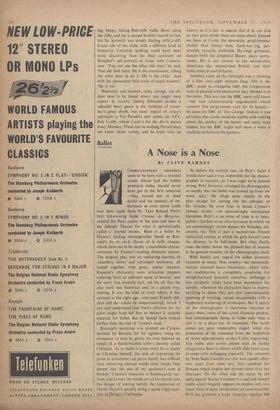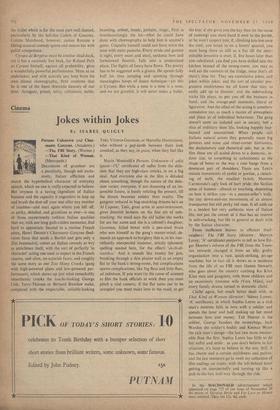Ballet
A Nose is a Nose
By CLIVE BARNES CROREOORAPNERS nowadays seem to be born with a suicidal streak. About half the ballets produced today should never have got to the first rehearsal —they started out as dead ducks and no amount of en- thusiasm or even talent could ever have made them fly. Take Roland Petit's first full-evening ballet Cyrano de Bergerac, created for Paris earlier in the year and now at the Adelphi Theatre for what is optimistically called a 'limited season.' Here is a ballet by France's leading choreographer based on Ros- tand's fin de siecle classic of la belle epoque, which turns out to be simply a marvellous charac- terisation by France's leading dramatic dancer. The original play was an endearing mixture of schoolboy ethics and schoolgirl sentiment, all lashed together with gusty, poetic rhetoric. Rostand's characters were articulate puppets suffering from an inflamed sense of honour, and the story was ornately daft, yet for all that the play itself was theatrical and, in a quaint way, moving. It was the kind of work which, if dis- covered at the right age—and most French chil- dren still do—could be unquestioningly loved. I can well understand how Petit's affection for the piece might have led him to believe it suitable material for ballet. But he should have looked farther than the end of Cyrano's nose.
Rostand's narrative was pivoted on Cyrano, spurned by Roxane for his ugliness, using his eloquence to woo by proxy his own beloved on behalf of a dunderheaded tailor's dummy called Christian. As in ballet Cyrano must be as dumb as Christian himself, the task of expressing the point in movement can prove hardly less difficult than conveying without words some simple little Phrase like 'the pen of my gardener's aunt is broken.' Cykrano's character is flamboyantly ver- bose, and to take the words out of his mouth runs the danger of leaving merely the impression of Jimmy Durante gamely doing a mime impersona- tion of Douglas Fairbanks So before the curtain rose on Petit's ballet I would have said it was impossible for the choreo- grapher to succeed, yet I was eager to be proved wrong. Petit, however, arranged his choreography so ineptly that the ballet was trussed up from the word 'allez.' He clings quite closely to the play—except for cutting out the sub-plot of De Guiche. He even tries to dance Cyrano's famous tirades with painstakingly inarticulate literalism. Petit's main error of taste is to inter- polate a kitchen scene divertissement in which we are astonishingly shown dances for brioches, ice- creams, etc. This is just a second-rate French music-hall routine in which the girls haven't even the decency to be half-nude. But what finally sinks the ballet below the plimsoll line of interest is the general banality of the choreography itself.
With hardly any regard for either dramatic situation or music, Petit employs the nineteenth- century classical dance vocabulary, which with- out modification is completely unsuitable for straightforward dramatic narrative. Although a few acrobatic tricks have been introduced for novelty, whenever his characters have to express anything in dance they just start conventionally spinning or twirling, varied occasionally with a haphazard scattering of arabesques. But if nearly all the choreography is classroom exercises in fancy dress, sonic of the actual dramatic produc- tion (choreography being to ballet only what a text is to a play) has its.moments..The battle scenes are, quite respectably staged, while the procession of the wounded from the battlefield of Arras appropriately evokes Callot engravings. The ballet also scores points with its darkly imaginative Basarie cidcors which slide from scene to scene with unflagging ingenuity. The costumes by Yves Saint-Laurent are chic and equally effec- tive, apart from some sexy little numbers for Roxane which display her charms more than her character. On the other side the music by, the aptly named Marius Constant is a sad and meagre tinkle which frugally appears to employ only two tunes, both of them reminiscent yet unmemorable. Petit has gathered a large company together for the ballet which is for the most part well danced, particularly by the hell-fire Cadets of Gascony. Colette Marchand, however, makes Roxane a fading musical comedy queen and dances her with pallid competence.
Cyrano de Bergerac must be another dead duck, yet it has a curiously live beak, for Roland Petit as Cyrano himself, against all probability, gives a wonderfully powerful performance. Mute as an undertaker, and with scarcely any help from his own dismal choreography, Petit confirms that he is one of the finest dramatic dancers of our time. Arrogant, proud, witty, ridiculous, noble, brawling, ardent, ironic, pathetic, tragic, Petit is breathcatchingly the lot—what he could have done with choreography to help him is anyone's guess. Coquelin himself could not have worn the nose with more panache. Every stride and gesture is right, every snort and snarl, sardonic bow and furbelowed flourish, falls into a predestined place. The flights of fancy have flown. The poetry has to be suggested with a glance. He spends fully half his time jumping and spinning through meaningless hoops of dance technique—yet this is Cyrano. But while a nose is a nose is a nose, and we are grateful, it will never make a ballet.



























































 Previous page
Previous page